President Joe Biden plans to pull U.S. troops from Afghanistan by September and will announce his decision tomorrow, White House sources told The Washington Post Tuesday.
The September timeframe replaces a May 1 deadline established by the Trump administration in agreement with the Taliban to bring home the more than 3,000 U.S. troops currently stationed in the country. It would come in time to mark the 20th anniversary of the September 11 terror attacks, which sparked a decades-long global struggle that includes the U.S. invasion of Afghanistan.
Biden has reportedly been weighing the decision for months, and has “concluded there is no military solution to the security and political problems plaguing Afghanistan,” CNN reported Tuesday.
Reaction to the news in Washington was mixed. House Armed Services Committee Chairman Adam Smith (D-WA) said, “Given the options, I think this is the best choice.” But Senate Minority Leader Mitch McConnell (R-KY) called the decision “reckless” and “an abdication of American leadership.”
Tallying the cost: While the cost in human suffering during the longest war in American history is incalculable and includes the loss of more than 2,300 U.S. service members and more than 100,000 Afghan civilians, the war has also come at considerable cost to the U.S. treasury. Though accounting for the costs of war can be a challenge, many analysts agree that the U.S. has spent more than $2 trillion on the conflict in Afghanistan.
An analysis by the Costs of War Project at Brown University in the fall of 2019 broke down the U.S. costs of the war in Afghanistan between 2001 and 2019 like this:
- $1 trillion for Defense and State Department budgets,
- $440 billion for off-budget military spending,
- $240 billion for veterans care,
- $455 billion in interest costs.
The numbers are no doubt higher now by tens of billions of dollars, given that nearly two more years of conflict have occurred since these estimates were made. And the withdrawal of troops does not bring the costs to an end. According to the Costs of War Project, the cost of caring for veterans continues for decades and accelerates as retired soldiers age. The group says that the U.S. can expect to spend more than $1 trillion in health care costs in the coming years for veterans of the post-9/11 wars, many of whom served in Afghanistan.




